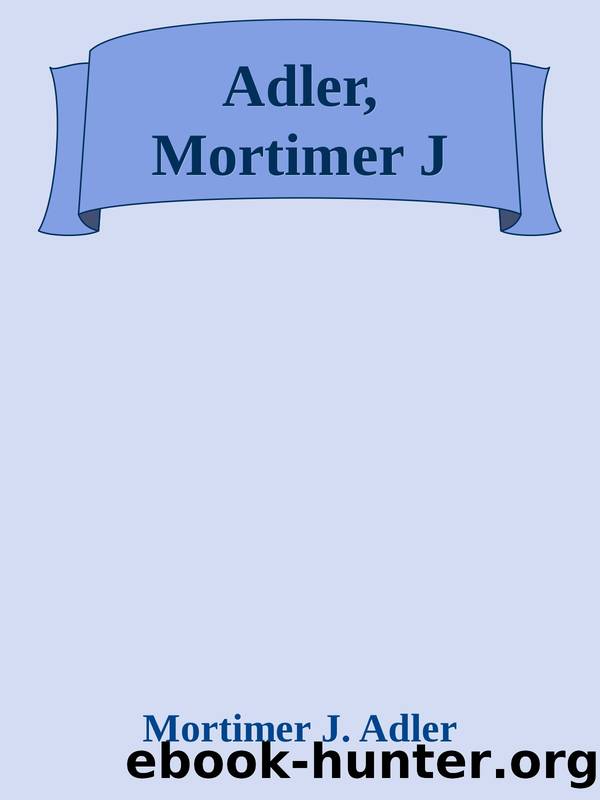Adler, Mortimer J by Mortimer J. Adler

Author:Mortimer J. Adler [Adler, Mortimer J.]
Language: eng
Format: epub
Published: 0101-01-01T00:00:00+00:00
5
Let us return to the focal point of this discussionâthe distinction between knowledge and mere opinion. On the one hand, we have self-evident truths that have certitude and incorrigibility; and we also have truths that are still subject to doubt but that are supported by evidence and reasons to a degree that puts them beyond reasonable doubt or at least gives them predominance over contrary views. All else is mere opinionâwith no claim to being knowledge or having any hold on truth.
There is no question that the findings and conclusions of historical research are knowledge in this sense; no question that the findings and conclusions of the experimental or empirical sciences, both natural and social, are knowledge in this sense.
As contrasted with such knowledge, which is knowledge of reality or, as Hume would say, knowledge of matters of fact and real existence, mathematics and logic are also knowledge, but not of reality. They are not experimental or empirical knowledge. They do not depend upon investigative research for their findings and conclusions.
The question that remains to be answered is the one that, in my judgment, Hume and Kant answered erroneously, an answer that has persisted in various forms down to our own day. Where does speculative or theoretical philosophy (by which I mean philosophical physics, metaphysics, and philosophical theology) stand in this picture? Is it mere opinion or is it genuine knowledge, knowledge that, like the empirical sciences, is knowledge of reality?
According to Sir Karl Popper, one of the most eminent philosophers of science in our time, the line of demarcation between knowledge and mere opinion is determined by one criterion: falsifiability by empirical evidence, by observed phenomena. An opinion, a view, a theory, that cannot be thus falsified is not knowledge, but mere opinion, neither true nor false in any objective sense of those terms. Drawing this line of demarcation, Popper places the experimental and empirical sciences on one side of the line, and theoretical philosophy (covering what I have indicated above) on the other side of the line.
Though it is couched in somewhat different terms, Popper thus repeats the conclusion Hume reached in his Enquiry. The reasons for reaching the opposite conclusion are as follows.
In the first place, what has been overlooked is the distinction between common and special experience. The empirical evidence to which science and history appeal is evidence that consists in observed data produced by methodical investigation, using all the devices and instrumentation of the laboratory and the observatory. Such observed data are no part of the experience of ordinary individuals who do not engage in scientific or historical investigation.
In sharp contrast to such special experience, available only to those who engage in investigation, there is the everyday, ordinary experience that all of us have during the waking hours of our life. This experience comes to us simply by our being awake and having our senses acted on. We make no effort to get it; we are not seeking to answer questions by means of it; we employ no methods to refine it; we use no instruments of observation to obtain it.
Download
This site does not store any files on its server. We only index and link to content provided by other sites. Please contact the content providers to delete copyright contents if any and email us, we'll remove relevant links or contents immediately.
| Booksellers & Bookselling | General |
| History of Books |
4 3 2 1: A Novel by Paul Auster(12391)
The handmaid's tale by Margaret Atwood(7763)
Giovanni's Room by James Baldwin(7346)
Asking the Right Questions: A Guide to Critical Thinking by M. Neil Browne & Stuart M. Keeley(5774)
Big Magic: Creative Living Beyond Fear by Elizabeth Gilbert(5771)
Ego Is the Enemy by Ryan Holiday(5445)
The Body: A Guide for Occupants by Bill Bryson(5096)
On Writing A Memoir of the Craft by Stephen King(4942)
Ken Follett - World without end by Ken Follett(4731)
Adulting by Kelly Williams Brown(4574)
Bluets by Maggie Nelson(4555)
Eat That Frog! by Brian Tracy(4536)
Guilty Pleasures by Laurell K Hamilton(4448)
The Poetry of Pablo Neruda by Pablo Neruda(4106)
Alive: The Story of the Andes Survivors by Piers Paul Read(4031)
White Noise - A Novel by Don DeLillo(4009)
Fingerprints of the Gods by Graham Hancock(4004)
The Book of Joy by Dalai Lama(3986)
The Bookshop by Penelope Fitzgerald(3852)
